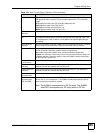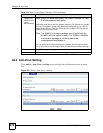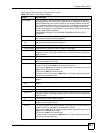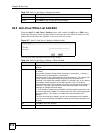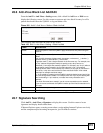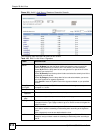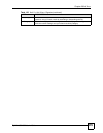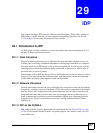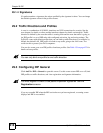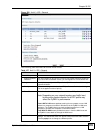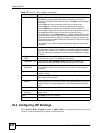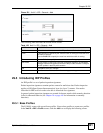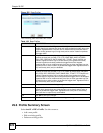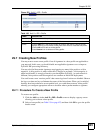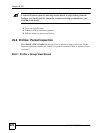
ZyWALL USG 300 User’s Guide
417
CHAPTER 29
IDP
This chapter introduces IDP (Intrusion, Detection and Prevention), IDP profiles, binding an
IDP profile to a traffic direction, custom signatures and updating signatures. See Section
5.4.15 on page 120 for related information on these screens.
29.1 Introduction to IDP
An IDP system can detect malicious or suspicious packets and respond instantaneously. It is
designed to detect pattern-based attacks.
29.1.1 Host Intrusions
The goal of host-based intrusions is to infiltrate files on an individual computer or server in
with the goal of accessing confidential information or destroying information on a computer.
You must install a host IDP directly on the system being protected. It works closely with the
operating system, monitoring and intercepting system calls to the kernel or APIs in order to
prevent attacks as well as log them.
Disadvantages of host IDPs are that you have to install them on each device (that you want to
protect) in your network and due to the necessarily tight integration with the host operating
system, future operating system upgrades could cause problems.
29.1.2 Network Intrusions
Network-based intrusions have the goal of bringing down a network or networks by attacking
computer(s), switch(es), router(s) or modem(s). If a LAN switch is compromised for example,
then the whole LAN is compromised. Host-based intrusions may be used to cause network-
based intrusions when the goal of the host virus is to propagate attacks on the network, or
attack computer/server operating system vulnerabilities with the goal of bringing down the
computer/server. Typical “network-based intrusions” are SQL slammer, Blaster, Nimda
MyDoom etc.
29.1.3 IDP on the ZyWALL
IDP on the ZyWALL protects against network-based intrusions. See Section 29.8.2 on page
427 for a list of attacks that the ZyWALL can protect against. You can also create your own
custom IDP rules.



